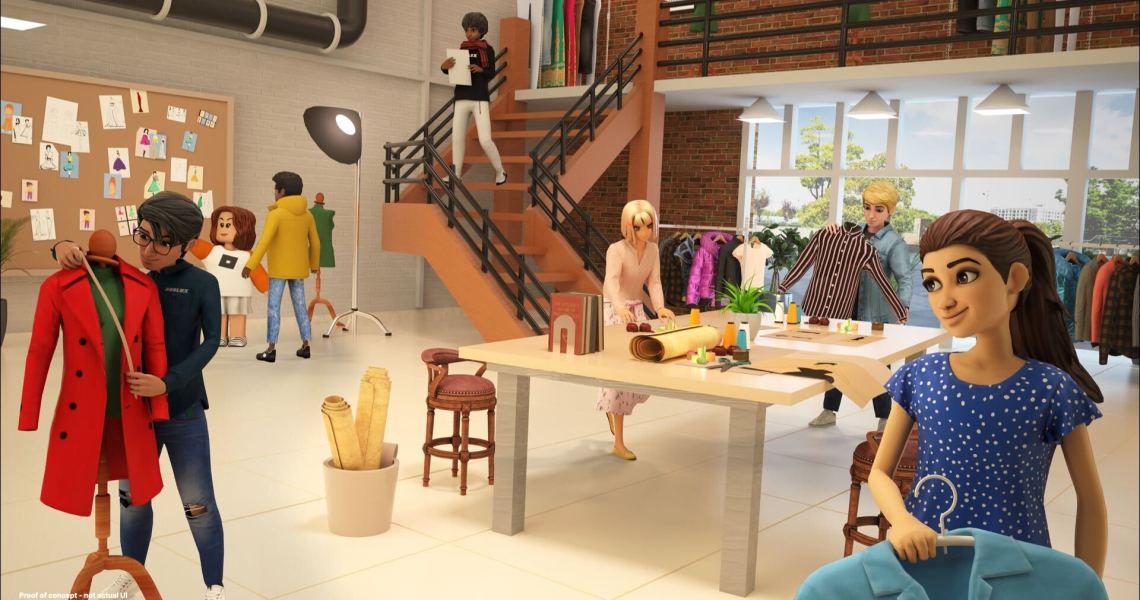Roblox has sold over a billion digital fashion items in 2022, and that trajectory doesn’t appear to be slowing down. In fact, for its key demographic of Gen Z, the interest in dressing up and customizing avatars is higher than ever.
In September, the company, in partnership with Parsons School of Design, conducted a 1,000-person survey of Gen Zers to inform its “Metaverse Trends Report.” The goal was to detail the digital fashion trend preferences of 14- to 24-year-olds living in the U.S. Along with the report’s release on Tuesday, Parsons simultaneously launched a course teaching digital fashion design on Roblox, to answer growing demand for digital fashion. The inaugural report showed that 70% of Gen Zers dress their avatars like they dress themselves and that their avatar’s style influences their own IRL looks.
Christina Wootton, vp of global partnerships at Roblox, said trends from the gaming platform and the wider metaverse will continue to influence trends in the physical world.
“The next generation of fashion designers and brands will be deeply immersed in digital fashion, dressing avatars, designing 3D digital versions of their collections and creating metaverse-exclusive items,” she said. “With Gen-Z consumers spending more time in immersive spaces and increasingly growing their economic power and influence on fashion, trends from the metaverse are expected to have a profound impact on physical fashion, while trends from the physical world will also continue to move into the metaverse.”
The report showed that digital fashion is an increasingly popular way for Gen Zers to express themselves. Half of all survey respondents said they change their avatar’s clothing at least every week, and 40% said self-expression via clothing and accessories in the digital world is already more important than expressing themselves in the physical world.
Digital fashion marketplace DressX has launched two digital fashion collections on Roblox and sold 50,000 items on the platform. Plus, it’s the biggest supplier of digital fashion in the metaverse, according to the company.
Daria Shapovalova, co-founder of DressX, said shopping in the physical world and shopping in the metaverse is not mutually exclusive.
“We don’t want people to shop less. Instead, we’re offering them a solution to keep or even grow their consumption patterns, and get the thrill of buying new fashion and changing outfits as much as they want, yet with a significantly lower environmental impact in the digital space,” she said. According to calculations from DressX, the carbon footprint of a digital garment is only 3% of a traditionally made cotton T-shirt.
Nearly three out of four survey respondents said they will spend money on digital fashion, with over one in four spending $20-$100 on a single virtual item. They change their outfits based on what their mood is (53%), as well as when they purchase new items, they said.
Beyond creating its own designs, DressX will expand the presence of traditional fashion brands in Roblox in the coming months. “Having partnered with Dundas, digitizing the brand’s haute couture items [including one that had] previously been worn on the Met Gala red carpet by Emily Ratajkovski, we see huge potential in bringing traditional brands to the Roblox ecosystem,” said Natalia Modenova, co-founder of DressX.
Dundas first released digital fashions on Roblox in September. “We were pleasantly surprised with how well digital fashion performed on Roblox with our first drop,” said Evangelo Bousis, co-founder of Dundas. “Our digital fashion strategy mirrors our physical fashion strategy, which from the beginning was based on inclusivity.” The brand declined to answer how well the first Dundas collection sold. The brand stocks U.S. sizes 0-16 and focuses on body-positive design.
Dundas is currently developing a Roblox holiday collection drop. It also plans to release a digital fashion collection during Paris Fashion Week in March, featuring looks straight off the runway. In addition, it’s creating size, hair and skin tone inclusive brand avatars.
Respondents from the Roblox report said inclusivity in the metaverse is important. Seventy percent said it’s important for avatars to have a full range of skin tones, 64% said a full range of body sizes is imperative, and 70% said brands should offer a full range of hair colors, textures and styles.
“We always aim to keep inclusivity at the forefront of our physical and digital garments. On Roblox, we love creating products for the diversity of avatars that truly represent the online community,” said a spokesperson from Tommy Hilfiger. The brand launched Tommy Play, its own metaverse world on Roblox, in June. It also integrated Roblox into its spring 2023 physical runway show during New York Fashion Week. “We would love to expand from items to avatars and personas. It would be a great way to see how the community expresses themselves.”
Christine Kohler, Puma marketing manager, agreed that Roblox has great potential for influencing IRL and digital fashion. “We believe customers shape our brand, and that’s why we rely on being an active participant in web3 to help shape what we do moving forward.”




